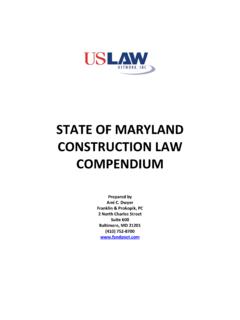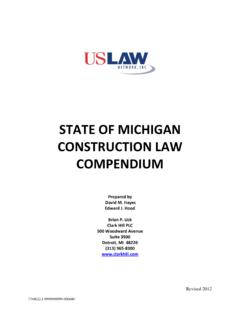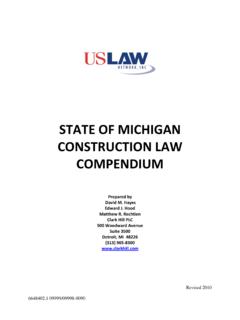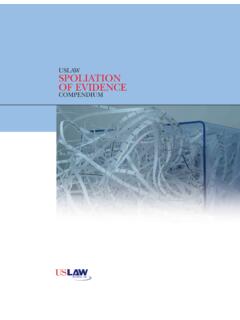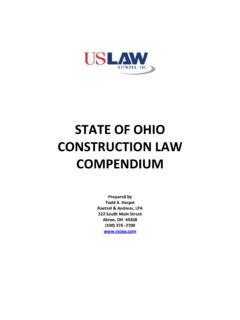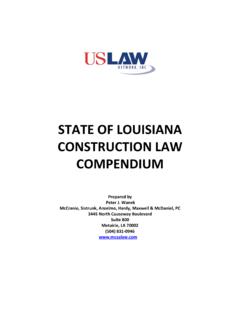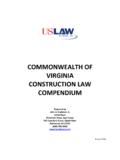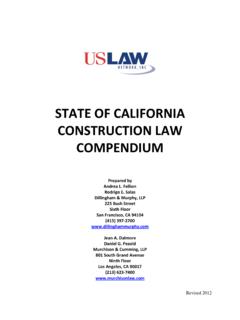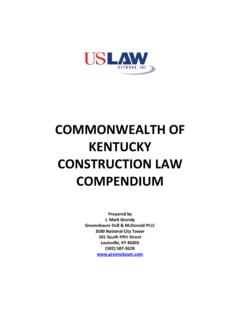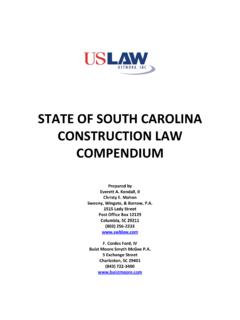Transcription of STATE OF NORTH CAROLINA CONSTRUCTION LAW …
1 Revised 2010 STATE OF NORTH CAROLINA CONSTRUCTION LAW COMPENDIUM Prepared by Thomas L. Ogburn III Joshua B. Durham Poyner Spruill LLP 301 South College Street Suite 2300 Charlotte, NC 28202 (704) 342-5250 2 I. Breach of Contract In NORTH CAROLINA , claims on a CONSTRUCTION project primarily involve claims for breach of contract. In order to properly plead a claim for breach of contract, the complainant should normally allege: 1) the existence of a contract, 2) the specific provisions breached, 3) the facts and circumstances constituting the breach, and 4) the amount of resulting damages.
2 Cantrell v. Woodhill Enterprises, Inc., 273 490, 160 476 (1968). [W]here the cause of action is a failure to construct in a workmanlike manner and with the material contracted for, plaintiff's pleading should allege wherein the workmanship was faulty or the material furnished by defendant was not such as the contract required. Id. at 497, 160 at 481. A party may also breach the contract by repudiation. A party repudiates a contract when, by his words or conduct, he expresses an unequivocal and absolute refusal or inability to perform.
3 Messer v. Laurel Hill Associates, 93 App. 439, 378 220 (1989). II. Negligence Negligence is the failure to exercise the appropriate standard of care under the given circumstances, whether that standard be imposed by statute or common law. In NORTH CAROLINA , in order to establish a claim for negligence, a party must prove: 1) a duty imposed by law to conform to a certain standard of care; 2) a failure to conform to that standard; 3) a causal nexus between the failure to conform to the standard and the resulting injury or damage; and 4) actual damages or injury. Sasser v.
4 Beck, 65 App. 170 (1983). Violations of the NORTH CAROLINA Building Code constitute negligence per se. Oates v. JAG, Inc., 314 276 (1985). While NORTH CAROLINA does recognize a claim for negligent CONSTRUCTION , it should be noted that NORTH CAROLINA has also long held that "[o]rdinarily, a breach of contract does not give rise to a tort action by the promisee against the promisor." Ports authority v. Roofing Co., 294 73, 81 (1978). Commonly known as the economic loss rule, there is no recovery under NORTH CAROLINA law in tort for purely economic losses.
5 Similarly, [A] tort action does not lie against a party to a contract who simply fails to properly perform the terms of the contract, even if that failure to properly perform was due to the negligent or intentional conduct of that party, when the injury resulting from the breach is damage to the subject matter of the contract. It is the law of contract and not the law of negligence which defines the obligations and remedies of the parties in such a situation. Kaleel Builders, Inc. v. Ashby, 161 App. 34, 43 (2003). In order to prevail on a claim for willful and wanton negligence, a party must prove a deliberate purpose to not to fulfill some duty imposed by law necessary for the safety of persons or property of others.
6 Akzona, Inc. v. Southern Ry. Co., 314 488 (1985). An act is willful if the defendant intentionally fails to carry out some legal duty imposed by law or contract which is necessary to protect the safety of the person or property to which it is owed. An act is wanton if the defendant intentionally fails to carry out some duty imposed by law or contract which is necessary acts in conscious or reckless disregard for the rights and safety of others. Civil 3 To be entitled to punitive damages, a party must prove willful or wanton conduct, which by definition under NORTH CAROLINA s punitive damages statutes is more than gross negligence.
7 Gen. Stat. 1D-5, 1D-15 (2003). NORTH CAROLINA remains in the discrete minority of states that recognizes the defense of contributory negligence. Under NORTH CAROLINA law, if a party asserting a claim based on negligence is found to have contributed, even the slightest amount, to its own injuries, the finding bars the party s right to recovery. A plaintiff is contributorily negligent when he fails to exercise such care as an ordinary prudent person would exercise under the circumstances in order to avoid injury. Newton v. New Hanover County Bd. of Educ., 342 554, 564 (1996).
8 III. Breach of Warranty A. Express Warranties In the CONSTRUCTION industry, warranties are generally defined as promises, or guarantees of the quality, quantity or duration of a product or certain CONSTRUCTION work performed. There are two types of warranties or guarantees involved in CONSTRUCTION contracting. The first is the express warranty , which is a warranty specifically agreed to by the parties and embodied in their CONSTRUCTION contract. See, Coates v. Niblock Development Corp., 161 App. 515, 588 2d 492 (2003). These provisions within the contract specify the duties of the parties and the time limits involved.
9 The most common warranty of this type is the contractor s promise regarding the quality of his work often found in the contract s General Conditions . This warranty usually promises the contractor s work will be of good quality, free from defects, and performed in accordance with the contract documents. The UCC express warranty provision ( Gen. Stat. 25-2-313) has also been applied to CONSTRUCTION projects. See, Westover Products, Inc. v. Gateway Roofing Company, 94 NC App. 63, 380 , 369 (1989); and Russell v. Baity, 95 NC App. 422, 383 217 (1989). There are four elements required of a successful claim for a breach of expressed warranty under the UCC: (1) a contract between the seller and buyer of goods; (2) a promise by the seller to the buyer relating to the goods, or a description of the goods, or showing a sample or model to the buyer, which is made part of the basis of the bargain; (3) breach of the warranty; and (4) damages caused by the breach.
10 See, Russell v. Baity, supra; Westover Products, Inc. v. Gateway Roofing Company, supra; and Salem Towne Apartments, Inc. v. McDaniel and Son s Roofing Company, 330 Fed. Supp. 906 ( 1970). B. Implied Warranties The second type of warranty is the implied warranty , which arises by operation of law from the nature of a particular transaction. There are a number of implied warranties which can arise under NORTH CAROLINA law relating to CONSTRUCTION . The most important implied warranty between an owner and a contractor is the one by which the owner warrants to the contractor the plans and specifications furnished by or on behalf of the owner are accurate and adequate for the contractor s performance of the work.
